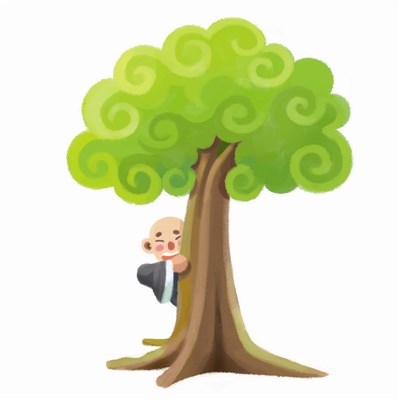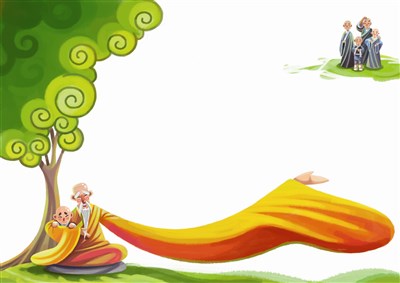 圖/香海文化提供
圖/香海文化提供
 圖/香海文化提供
圖/香海文化提供
慈悲就像是溫暖的春風,慈悲就像清涼的甘露,在慈悲的光輝之下,即使是暴戾之氣,也會溶化;即使在桀傲不遜的劣徒,也會有所改變。從盤珪禪師身上,我們看到有時佛菩薩深層的慈悲,不是我們凡夫一下之間就可以理解的。──慈惠法師
中文/ 慈惠法師
英文/ 佛光山人間佛教研究院
Translated into English by: FGS Institute of Humanistic Buddhism
When we hear "he is my disciple," usually we would think that such a disciple must be very outstanding, and his master would be proud of him. However, when Chan Master Pan Gui said such sentence, he was referring to his worst disciple.
There was a devotee of Chan Master Pan Gui. He had a child who had a bad habit of stealing. No matter how hard he tried to punish or guide his child, his bad habit still remained. In the end, as a last resort, he went to the Chan Master for help. He said, "Master, my son is really hard to teach. Can you take him as your disciple? Please teach him for me."
Chan Master Pan Gui promised to take him as his disciple out of compassion. However, this child still couldn't resolve his stealing habit. He was still stealing in the monastic community. At first, everyone would go and tell Chan Master Pan Gui. However, despite the many complaints, the Master didn't do anything about it.
Finally, some disciples couldn't bear it anymore. They gathered in front of the Chan Master and said, "Master, how could you keep such a nasty person in the monastery, and let us be the victims of his bad habit? Why aren't you doing anything about it?" said the disciples.
"In your opinion, what do you think I should do?" the Chan Master asked.
"Master, we hope that you could dispel him because this is a place for practice. It is not a place for thieves here. If you don't ask him to leave, then we will all leave."
Having heard all that, the Chan Master said, "All of you wish to leave? Okay! Since you are in a rush to leave, then don't let me keep you. Go now!"
All of them were shocked with the Chan Master's response and could not figure out the logic of why their Master would say such a thing.
Chan Master Pan Gui continued, "All of you may leave because you all know how to purify and love yourself, and you no longer need my guidance. Some of you could even take on the responsibility to propagate Buddhism. However, this disciple, he has no other places to go. I shall keep him here with me. Right now, I have only one disciple to teach. As for the rest of you, I won't need to worry or guide you anymore."
After that, the disciples felt really sad and realized that their Master had great compassion! Even though their Master reckoned they had graduated, in reality, they had yet to learn about compassion. They felt remorse for not being able to tolerate even just one person who had flaws.
When the disciple with the stealing habit heard about the incident, he was also remorseful. He thought to himself, "Actually, the Master has been putting his heart in teaching and looking after me. But I am still stealing."
After being touched by Chan Master Pan Gui, the disciple quit his bad habit and later became a Chan Master who made great contributions.
翻譯
當我們聽到「他是我的徒弟」這句話,很本能會想到這個徒弟應該很傑出,讓他的師父引以為榮。但是,盤珪禪師說這句話時,這個徒弟卻是最不肖、最糟糕的弟子。
話說有位盤珪禪師的信徒,家裡有一個喜歡偷錢的壞孩子,無論怎麼打罵、教導,都改不了偷竊的惡習。最後,信徒實在沒有辦法,只好向禪師求助。信徒說:「師父,我這個兒子實在教不來,讓他跟你出家好嗎?拜託你教育他。」
盤珪禪師慈悲的答應,將他收為徒弟。但是,這個孩子改不了偷竊的習慣,常在僧團裡行竊。起初,大家都跟盤珪禪師反映,但是說了幾次,也不見盤珪禪師處理。
終於,徒弟們忍受不了,集體到盤珪禪師的面前說:「師父!這麼一個惡劣的人,怎麼能把他擺在禪堂裡,讓我們全體都受害呢?而且您還不處理!」
禪師說:「依你們的意思,該怎麼辦呢?」
弟子說:「師父,我們希望您把他趕走,因為這裡是道場,不能有小偷存在,假如您不把他趕走,我們全體都要離開。」
盤珪禪師聽了以後,說:「你們全體都要走?好啊!你們既然急著走,那就快走吧。」
大家聽到師父的回答後,全都愣住了,這是什麼道理,師父怎麼這樣講啊!
盤珪禪師接著又說:「你們都可以走,因為你們都能潔身自愛,不用我再教導,不用我再教導,甚至能擔當起弘揚佛法的責任。但是,他不能去別的地方,只好放在我這裡。現在我要教的徒弟,只有這一個,你們已經不需要我再擔心、教導了。」
徒弟們聽了都很難過,原來師父是這麼的大慈大悲!雖然師父認為我們都畢業了,但實際上我們並沒有學到慈悲,就連一個有缺點的人都容納不下,實在慚愧呀!
那個偷錢的徒弟,聽到了這件事,也覺得很慚愧,心想:「原來師父是這麼苦心在照顧我,而我竟然還在這裡繼續偷錢。」
就這樣,在盤珪禪師的感召之下,偷錢的徒弟痛改前非,後來成為一個饒有貢獻的禪師。
原來如此
Out of compassion
「Out of」這裡的意思是「源自、出於」,例如:「She made donations to the orphanage out of sympathy.」(出於同情心,她捐獻給孤兒院。)
古印度著名史詩《薄伽梵歌(Bhagavad Gita)》的一段經典對話,也出現過包含「Out of compassion」的句子:
「Out of compassion I destroy the darkness of their ignorance. From within them I light the lamp of wisdom and dispel all darkness from their lives.」(發自內心的慈悲,我驅散他們黑暗般的無知,從中點亮生活智慧的燈。)
bear
「bear」 是「忍受」。例如:「Amy could not bear that her friends should laugh at her all the time. 」(愛咪忍受不了朋友們一直嘲笑她。)
「I don't feel very well. I can't bear this weather. 」(我覺得不太舒服。我無法忍受這種天氣。)
「bear」 也是「承擔」。例如:Her parents bear all expenses. 安妮•巴德太太承擔一切費用。
「bear」與倒數第三段的「tolerate」都有「容忍」的意思。例如:「I cannot tolerate your bad manners.」 (我不能容忍你的惡劣態度。)
「tolerate」廣義的說是「容許」。例如:「Our school won't tolerate any cheating on exams.」 (我們學校不容許任何考試作弊。)
propagate
「propagate」 是「繁殖」,例如:「Plants propagate themselves by seeds.」( 植物靠種子繁衍。)
「propagate」也 是「普及」,例如:「propagate scientific knowledge」(普及科學知識)
Plant propagation is both a science and an art.(植物的繁衍,既是科學也是藝術。)是科學,因為需要技巧與演化;是藝術,因為若要成功繁衍,必須心領神會。